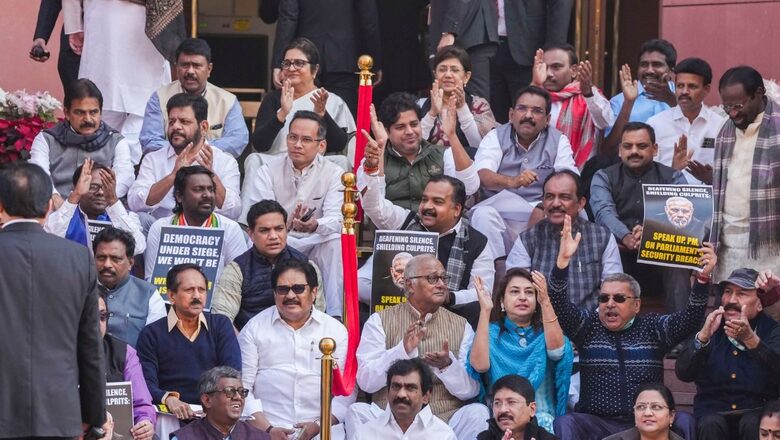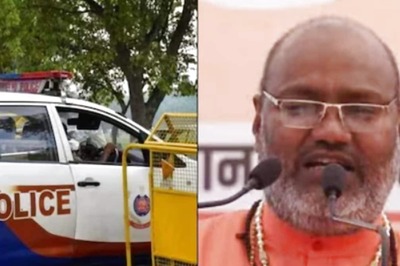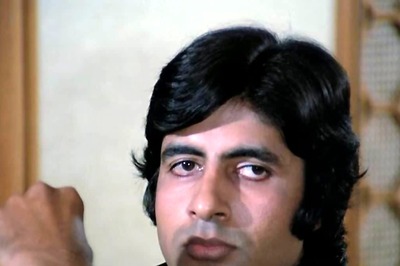
views
They could well set up a parallel parliament. 143 opposition Members of Parliament have been suspended over the past week ever since the Lok Sabha was breached. And the way things are evolving, it is quite possible that Parliament may be “opposition-mukt" soon.
Critics of the Narendra Modi government are saying that the action taken by the custodians of both Houses of Parliament is unprecedented and reeks of vengefulness.
Truth be told there’s little reason for the Modi government to rub the opposition’s nose into the ground. The voter has arguably already cut the I.N.D.I.A bloc’s mascot the Congress party down to size in the recent assembly polls.
Experts will agree that a deflated I.N.D.I.A bloc poses little threat to the BJP ahead of the 2024 general elections.
This is, of course, not to say that this article is entirely ruling out vendetta as a motive behind the summary suspension of opposition MPs. It bears repetition that the power to suspend MPs must be used with discretion. That is the action to suspend 143 MPs must not only be justifiable under the rules, but it also must pass the smell test.
Now, while the breadth of the disciplinary action is certainly eye-catching, it is not unprecedented either. Not the suspensions per se. Back in the day, 1989 to be precise, the Speaker of the Lok Sabha suspended 63 MPs in a flash. At the time the Rajiv Gandhi dispensation enjoyed a brute majority in Parliament. Back then the suspensions were hailed as an example of the Speaker privileging discipline over the whimsies of parliamentarians.
In the recent past, BJP legislators have been suspended from state legislatures for unruly conduct. In Bengal, Tamil Nadu, Jharkhand, and even Delhi, which are all ruled by non-BJP opposition parties, suspensions on disciplinary grounds are common. In fact, the suspension for one year of a dozen Maharashtra BJP MLAs was revoked by the Supreme Court for being an “irrational" act “negatively impacting the democratic set-up". Clearly, this act failed both the test of legality and smell.
Noticeably, the left-liberal ecosystem has never bemoaned the “murder of democracy" at any of these times. So why is it that in the age of Modi, the suspension spree is being ascribed pejorative motives?
The answer could lie in the tactics the opposition has deployed since 2014 when Modi won a majority. The opposition is desperate to counter the NDA’s project of publicising its majority as a source of stability and decisive governance. This has led the opposition to spin a narrative that the NDA uses its electoral majority as a blunt and brutish instrument of oppression.
Thus, when the ED raids opposition politicians, Modi’s opponents will often claim he has reduced the agency to being the sword arm of the BJP. When the opposition loses an election, it claims Modi has turned the EC into its handmaiden. When the state prosecutes alleged “anti-nationals", it is because a power-drunk BJP is snuffing out dissent. And when the Speaker and Chairman of the Houses throw the rule book at opposition MPs, it is because they “lack a spine and are there only to serve Modi".
To the layman, the mass suspension of opposition MPs may well appear as a confirmation of this narrative.
But under Modi, the rules of engagement in the Houses of Parliament have undergone a visible change. A metaphorical line has been drawn, distinguishing between the opposition’s right to principled protest and unvarnished disregard for the rules and norms of constructive engagement.
The new normal seems to be signalling that the onus to ensure the smooth functioning of Parliament doesn’t any longer lie exclusively with the government – the treasury benches.
In the past, after each protracted stand-off in the Houses of Parliament, government floor managers were constantly exhorted to reach across the aisle and assure the opposition that they would get the democratic space to conduct business.
Not anymore. The task of upholding the sanctity of dialogue in a parliamentary democracy, the Modi government is suggesting, must also be an act of bipartisanship. The opposition must now also be seen to be constructive.
Will the opposition heed the message? Or will it reflexively oppose the Modi administration ascribing to itself the right to set a new code of conduct in Parliament?



















Comments
0 comment